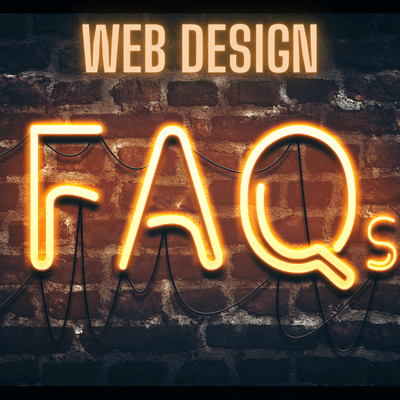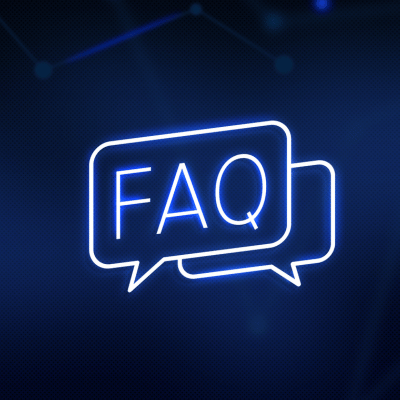If you’re planning a new website or thinking about updating your current one, you’re bound to have questions. This FAQ section is designed to provide clear, concise answers to the most common questions we hear from clients. From timelines and pricing to platforms and features, you’ll find straightforward information to help guide your web design journey.
Website Design FAQs

What is included in your web design services?
Our web design services include custom layout design, responsive mobile optimization, basic SEO setup, content integration, and testing. We also assist with domain and hosting setup, and provide training on how to manage your site using a content management system (CMS) like WordPress.
How long does it take to design a new website?
Most websites take 3 to 6 weeks to complete, depending on the size and complexity of the project. This timeline includes planning, design, revisions, development, and testing. Faster turnarounds are possible for smaller or simpler sites.
Do you build custom websites or use templates?
We build custom websites tailored to your brand and goals. While templates can be used for faster turnaround or budget projects, our standard service focuses on unique designs built from scratch using modern frameworks and content management systems.
Can I update the website myself after it’s launched?
Yes, all of our websites include a content management system (CMS) that allows you to easily update text, images, and other content without coding knowledge. We also provide training and support if needed.
What platforms do you use for web design projects?
We work with WordPress, WooCommerce, Shopify, PHP/Laravel and Joomla! frameworks. WordPress is our most popular choice due to its flexibility, ease of use, and strong support for SEO and plugin integrations.
Will my website be mobile-friendly and responsive?
Yes, every website we build is fully mobile-friendly and responsive. This means your site will automatically adjust to look great on phones, tablets, and desktops, improving user experience and search engine rankings.
Can you redesign my existing website?
Absolutely. We can modernize your existing website by improving design, structure, loading speed, and mobile compatibility. We also ensure your site meets current SEO standards and user expectations.
What’s the cost of a professional website design?
Professional website design typically ranges from $2,500 to $10,000 or more, depending on your specific needs. Costs vary based on the number of pages, design complexity, e-commerce features, and integrations required.
Will my site be optimized for search engines?
Yes, all of our websites include basic on-page SEO optimization. This covers keyword-focused headings, meta tags, alt image descriptions, fast loading speeds, and mobile responsiveness—all essential for good search engine visibility.
How many design revisions are included?
We include unlimited design revisions with every project. This gives you the opportunity to fine-tune the layout, colors, images, and overall user experience before final approval and development.
Web Design Company FAQ

Why should I choose your web design company?
We combine over 20 years of experience with a personalized approach to each project. Our team focuses on results-driven design, SEO best practices, and long-term client support to ensure your website helps grow your business.
What industries do you serve with your web design services?
We work with a wide range of industries, including healthcare, legal, e-commerce, education, entertainment, and startups. Our design approach adapts to meet the needs of both local and national businesses.
Do you offer support after the website goes live?
Yes, we provide post-launch support that includes bug fixes, CMS training, plugin updates, and optional ongoing maintenance plans. Our goal is to keep your website secure, up to date, and performing well.
Can you help with domain registration and hosting?
Yes, we can assist with registering your domain name and setting up reliable, fast hosting. We also help manage DNS settings, SSL certificates, and email setup if needed.
Do you offer project-based or ongoing web design packages?
We offer both. Project-based services are ideal for one-time builds, while our ongoing packages support regular updates, backups, and performance optimization to keep your website running smoothly.
How do you ensure your website designs align with my brand?
We begin every project with a discovery phase to understand your brand, target audience, and goals. Our design team then creates mockups based on your style, logo, and message for full alignment.
What sets your company apart from other web design firms?
We offer personalized service, fast response times, and designs that convert. Unlike template-driven firms, we build websites tailored to your goals using proven strategies that boost traffic and engagement.
How do you manage communication during the design process?
We use email, Zoom, and project management tools like Trello, Slack or Basecamp to keep communication organized. You’ll get regular updates and clear timelines throughout the project lifecycle.
Will I own my website after it’s completed?
Yes, once the project is finished and paid in full, you’ll have full ownership of the website, including all design files, content, and code. We provide login credentials and transfer all assets to you.
Can you work with my existing marketing or development team?
Absolutely. We often collaborate with in-house teams to ensure design, development, and marketing strategies align. We’re happy to integrate our efforts with yours for seamless results.
Web Design FAQ
What is the difference between web design and web development?
Web design focuses on the look, layout, and user experience of a website. Web development involves coding and functionality, bringing the design to life using programming languages and platforms.
What is a content management system (CMS), and do I need one?
A CMS is a tool that lets you manage your website content without coding. If you want to update text, images, or blog posts yourself, a CMS like WordPress is highly recommended.
How can I improve the loading speed of my website?
To speed up your website, optimize image sizes, use a caching plugin, reduce unused scripts, and choose fast hosting. A quick-loading site improves user experience and search engine rankings.
What is responsive design, and why does it matter?
Responsive design ensures your website looks good on all devices, from desktops to phones. It improves usability, keeps visitors engaged, and is essential for SEO performance on mobile search results.
How do I know if my website needs a redesign?
If your site looks outdated, loads slowly, isn’t mobile-friendly, or doesn’t convert visitors into customers, it’s time for a redesign. User feedback and declining traffic are also key indicators.
Do I need a blog or landing page as part of my web design?
A blog helps with SEO and customer education, while landing pages focus on conversions. Both are valuable, depending on your goals. Most businesses benefit from including at least one of each.
What are the most common website design mistakes?
Common mistakes include slow load times, poor mobile layout, cluttered navigation, outdated visuals, and lack of clear calls-to-action. Avoiding these helps improve user experience and results.
Should my FAQ page include a search bar or navigation menu?
Yes, adding a search bar or categorized menu improves usability. It helps visitors find answers faster, reduces support tickets, and improves the overall customer experience on your site.
Can a good FAQ section reduce support tickets?
Yes, a well-written FAQ page answers recurring questions, which lowers the volume of support requests. It saves time for both your customers and your support team.
Is it possible to integrate a chat widget or support ticket system?
Yes, we can integrate chat widgets and ticket systems into your website. These tools help users get instant answers or contact support without leaving the page.
Web Design Frequently Asked Questions

How can I make my website more user-friendly?
To make your website user-friendly, keep navigation simple, use clear calls-to-action, ensure fast load times, and design with mobile in mind. Consistent layout and readable text also improve usability.
What’s the difference between a homepage and a landing page?
A homepage introduces your brand and links to all site sections. A landing page is focused on one goal, like capturing leads or promoting a product, often used in marketing campaigns.
Should I include customer reviews or testimonials on my site?
Yes, customer reviews build trust and can influence buying decisions. Adding testimonials to your website or landing pages increases credibility and improves conversion rates.
How do internal linking and navigation affect customer experience?
Good internal linking helps users move through your site easily and find answers faster. Clear navigation improves engagement and helps search engines index your content properly.
Can you help organize my FAQ section and popular questions?
Yes, we can structure your FAQ section using categories, plus-sign toggles, and a search bar. Organizing questions helps users find relevant answers without feeling overwhelmed.
What kind of analytics tools can be added to my web page?
We can integrate tools like Google Analytics, Hotjar, or Meta Pixel to track traffic, user behavior, conversions, and more. These tools help improve performance and marketing strategy.
How often should I update my FAQ page content?
Update your FAQ page every few months or whenever new questions arise. Regular updates keep your content relevant, improve SEO, and reflect current business offerings.
What should I include on a good contact page?
A good contact page includes a contact form, phone number, email, physical address (if applicable), and links to social media. Adding a map and business hours is also helpful.
How does an FAQ page improve SEO and search engine rankings?
An FAQ page improves SEO by targeting question-based keywords, increasing time on site, and earning featured snippets. It also helps answer customer questions directly in search results.
Can my FAQ page have expandable sections with a plus sign?
Yes, we can design expandable FAQ sections using plus signs. This improves readability and keeps the layout clean while allowing users to explore answers at their own pace.
Website Strategy and Planning FAQ

What should I prepare before starting a website project?
Before starting a website, gather your branding assets, list your goals, outline desired features, prepare content or a sitemap, and define your target audience. Clear preparation speeds up the process and improves results.
Do I need to write all the content for the website?
No, we can help write or improve your content if needed. However, any original materials like product descriptions, bios, or service lists help ensure your site reflects your brand accurately.
How do you determine the structure of the website?
We plan your site structure based on your content, goals, and user flow. This includes the homepage, service pages, landing pages, blog, contact page, and a FAQ section if needed.
What makes a landing page different from other web pages?
A landing page is designed for a single goal—like lead capture or a product sale. It minimizes distractions, excludes navigation, and focuses on converting visitors into customers.
Can you help with choosing a domain name?
Yes, we offer advice on selecting a domain name that’s brand-friendly, short, easy to remember, and relevant to your business. We can also help check domain availability and secure it.
How do I know what pages my site should have?
Typical websites include a homepage, about page, services, contact, blog, and FAQ. We work with you to create a page plan that suits your audience and business goals.
Will my website include a privacy policy and terms page?
Yes, we can add legal pages like privacy policy, terms and conditions, and cookie notices. These are especially important for GDPR and compliance with online privacy laws.
Can I see examples of your previous work?
Yes, we’re happy to share portfolio samples that match your industry or goals. Reviewing past projects helps you understand our style and approach before starting your own.
Do you offer competitor research before design starts?
Yes, we analyze competitor websites to identify strengths, weaknesses, and industry trends. This helps us create a site that stands out and better serves your audience.
How do I know if your agency is a good fit for my project?
If you value clear communication, strategic planning, and results-focused design, we’re likely a good fit. A discovery call helps determine if our process and team align with your needs.
Technical and Security FAQ

Will my website be secure from hackers?
We implement SSL encryption, security plugins, regular backups, and firewalls to help protect your site. Strong passwords and user permission settings are also part of the security setup.
Do you offer website backups?
Yes, we offer automated daily or weekly backups to ensure your website can be restored quickly if needed. Backup services are included in our maintenance plans.
Can you make my website ADA compliant?
Yes, we offer accessibility upgrades to meet ADA compliance standards, including proper contrast, alt text, keyboard navigation, and screen-reader support where applicable.
Will my website be optimized for speed?
Yes, we optimize code, images, caching, and hosting settings to ensure fast load times. A fast site improves both user experience and search engine rankings.
Can I integrate third-party tools like CRMs or booking apps?
Yes, we can integrate tools like HubSpot, Calendly, Mailchimp, or custom booking software. Let us know what systems you use, and we’ll help connect them to your site.
Is ongoing website maintenance required?
Yes, regular updates to plugins, themes, and CMS core are needed to keep your website secure and functional. We offer affordable plans for monthly maintenance.
Will you test the website before launch?
Yes, we conduct quality checks for mobile responsiveness, loading speed, browser compatibility, and contact form functionality before launching your website.
What happens if something breaks on the site?
If you’re on a maintenance plan, we fix it quickly. For others, we offer one-time troubleshooting services. We aim to resolve issues within 24–48 hours.
Do you offer SSL certificates?
Yes, we provide and install SSL certificates for your website, ensuring all data passed between users and the site is encrypted. This builds trust and supports SEO.
Can my website be converted into an app later?
Yes, we can create a progressive web app (PWA) or develop a native app version based on your site’s features. This allows users to access your services more easily on mobile.
Website Marketing and Performance FAQ

Will my website be ready for Google Ads or Facebook Ads?
Yes, we set up tracking pixels, conversion goals, and fast-loading pages—making your site campaign-ready. We also help ensure your landing pages are optimized for ad performance.
Can I track visitors on my website?
Yes, we install Google Analytics & Google Search Console and other tools so you can monitor traffic, behavior, bounce rates, and conversions. We also explain how to read the reports if needed.
Do you offer SEO services with the website?
Yes, all websites include basic search engine indexing. We also offer advanced monthly SEO campaigns for keyword research, backlinks, technical audits, and long-term ranking strategies.
Will my website show up in search engine results?
Yes, we follow SEO best practices so your site is indexed properly by search engines. While rankings depend on many factors, our setup gives your site a strong foundation.
How can I improve my site’s conversion rate?
Improving conversions involves optimizing page speed, headlines, layout, trust signals, and calls-to-action. We apply proven UX strategies to boost engagement and conversions.
Do you help with content writing or blogging?
Yes, we offer content creation services including blog writing, landing page copy, product descriptions, and editing. We tailor each piece to your audience and SEO goals.
Can I connect my website to social media accounts?
Yes, we link your website to platforms like Facebook, Instagram, and LinkedIn. We also add sharing buttons and embedded feeds to increase visibility and engagement.
Do you help improve existing site traffic?
Yes, we offer SEO audits, site performance improvements, and targeted marketing strategies to help grow your website traffic over time.
How often should I update my website content?
Update your content as often as possible or when your services change. Fresh content keeps visitors engaged and helps with search engine rankings.
Can I add a blog to my website later?
Yes, we can add a blog at any time. Blogging supports SEO, positions you as an expert, and gives you fresh content to share with your audience.
Conclusion: Building Confidence Through Clear Answers

A good FAQ page does more than just answer questions—it empowers customers, improves the user experience, and supports your business goals. By addressing the most frequently asked questions about website design, development, security, and marketing, we aim to remove confusion and build trust from the very first glance. Whether you’re planning a brand-new website or refreshing an outdated one, knowing what to expect makes the entire process smoother and more successful.
At Sunlight Media, we believe a comprehensive FAQ section is a key part of any customer-focused company. It supports informed decision-making, reduces support requests, and increases confidence in your services. We’ve carefully structured these questions and answers to reflect real concerns, offer clear insights, and provide concise answers that are easy to find—especially with internal linking and search bar integration.
Still have a specific question not covered here? Visit our contact page to reach our support team, or use the chat widget to start a conversation. We’re here to help you find answers and take the next step in your web design journey.

